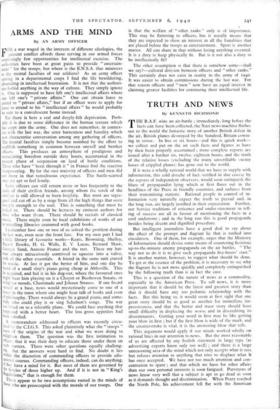ARMS AND THE MIND By AN ARMY OFFICER F OR a
war waged in the interests of different ideologies, the present conflict affords those serving in our armed forces surprisingly few opportunities for intellectual exercise. The authorities have been at great pains to provide " entertain- ment " for the troops, but where is the E.N.S.A. that ministers to the mental faculties of our soldiers? As an army officer serving in a departmental corps I find the life bewildering, abounding in intellectual frustration. It is not that the authori- ties forbid anything in the way of culture. They simply ignore it. One is supposed to have left one's intellectual affairs where one left one's " private affairs." One can obtain leave to attend to " private affairs," but if an officer were to apply for leave to attend to his " intellectual affairs " he would probably be sent to a convalescent home instead.
Yet there is here a real and deeply-felt deprivation. Prob- ably it is due to some difference in the human texture which has crept into the army. One does not remember, in connex- ion with the last war, the utter barrenness and banality which now characterise conversation among any gathering of officers. The mental faculties simply become numbed by the effort to establish something in common between oneself and brother officers. This produces an atmosphere of prodigious and excruciating boredom outside duty hours, accentuated in the present phase of suspension on land of battle conditions. Those who have " been through it " in France find the reaction overpowering. By far the vast majority of officers and men did not share in that tumultuous experience. The battle-scarred ones are apt to feel lonely.
Some officers can still return more or less frequently to the circle of their civilian friends, among whom the torch of the inteliect is still allowed to burn brightly. But most are segre- gated and cut off as by a siege from all the high things that once broeght strength to the soul. This is something that must be look..d to. There should be lectures by eminent authors for those who want them. There should be recitals of classical music. There might even be local exhibitions of works of art or travelling libraries crammed with good books.
I remember how one or two of us solved the problem during the last war, even near the front line. For my own part I had a little library of favourite works—Keats, Browning, Shelley, keit Brooke, H. G. Wells, E. V. Lucas, Bernard Shaw, Georges Sand, Anatole France and the rest. These my bat- man always miraculously contrived to squeeze into a valise, with all the other essentials. A friend in the same unit craved for music. At last it got the better of him, and one day he heard of a small ship's piano going cheap at Abbeville. This he acquired, and hid it in his dug-out, where the favoured ones might hear him playing on it a Chopin or Beethoven Sonata, or ligher moods, Chaminade and Johann Strauss. If one found Oneself at a base, news would mysteriously come to one of a house in the town where one might hear talk of books and even of philosophy. There would always be a grand piano, and some- body who could play it or sing Schubert's songs. The war was lifted on to a tolerable plane. We could face anything that happened with a better heart. The less gross appetites had been satisfied.
A memorandum addressed to officers was recently circu- lated by the C.I.G.S. This asked plaintively what the " troops " knew of the origins of the war and what we were doing to enligh ten them. The question was the first intimation to Officers that it was their duty to educate those under them on such matters. There were other questions equally challeng- lag. But the answers were hard to find. No doubt it lies within the discretion of commanding officers to provide edu- cational courses. Commanding officers, indeed, can do anything, if they have a mind for it. But most of them are governed by the fancies of those higher up. And if it is not in " King's Nulations," that is enough for them. There appear to be two assumptions rooted in the minds of thse who are preoccupied with the morale of our troops. One is that the welfare of " other ranks " only is of importance. This may be flattering to officers, but it usually means that they are expected to show an interest in all the banalities that are placed before the troops as entertainment. Sport is another matter. All can share in that without losing anything essential. It is a duty to keep physically fit. But is it not also a duty to be intellectually fit?
The other assumption is that there is somehow some—shall we say?—cultural division between officers and " other ranks." This certainly does not exist in reality in the army of 194o. It was easier to obtain commissions during the last war. For that reason officers and " men " now have an equal interest in claiming greater facilities for continuing their intellectual life.


























 Previous page
Previous page